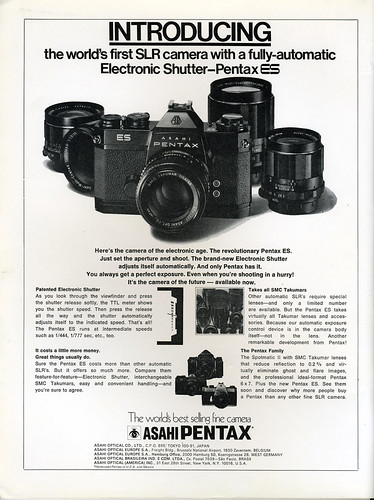Difference between revisions of "Pentax ES"
(Interim save) |
(Another interim save) |
||
| Line 8: | Line 8: | ||
|image_rights= non-commercial | |image_rights= non-commercial | ||
}} | }} | ||
| − | The '''Pentax ES''' was announced by [[Pentax|Asahi]] in 1971,<ref>According to [http://www.pentaximaging.com/about/history/ Pentax Imaging]; [[McKeown]] dates it to 1972.</ref> as the world's first SLR with 'fully-automatic electronic shutter'. It offers what has since become familiar as [[aperture priority]] automatic exposure (shutter priority AE was already possible with other cameras, such as the [[Canon F-1]], at this time). Electronic shutter timing makes aperture-priority AE possible because it allows the shutter speed to be essentially continuously variable, not restricted to stop or half-stop values. The camera also makes an early use of a memory circuit in exposure control. | + | The '''Pentax ES''' was announced by [[Pentax|Asahi]] in 1971,<ref>According to [http://www.pentaximaging.com/about/history/ Pentax Imaging]; [[McKeown]] dates it to 1972.</ref> as the world's first SLR with 'fully-automatic electronic shutter'. It offers what has since become familiar as [[aperture priority]] automatic exposure (shutter priority AE was already possible with other cameras, such as the [[Canon F-1]], at this time). Electronic shutter timing makes aperture-priority AE possible because it allows the shutter speed to be essentially continuously variable, not restricted to stop or half-stop values. Manually-set shutter speeds are ''mechanically'' timed, however, and so not dependent on the camera battery. The camera also makes an early use of a memory circuit in exposure control, to store the exposure setting in the brief period of 'blackout' when the mirror is moved to allow exposure. |
Asahi's literature<ref>[http://www.pentaximaging.com/files/manual/ES.pdf User's Manual] for the ES (pdf) at [http://www.pentaximaging.com Pentax Imaging]</ref> emphasises the advantage that, since the mechanisms involved in this mode of AE were in the camera body, not the lens, the camera could be used, in AE, with almost all existing Takumar lenses. | Asahi's literature<ref>[http://www.pentaximaging.com/files/manual/ES.pdf User's Manual] for the ES (pdf) at [http://www.pentaximaging.com Pentax Imaging]</ref> emphasises the advantage that, since the mechanisms involved in this mode of AE were in the camera body, not the lens, the camera could be used, in AE, with almost all existing Takumar lenses. | ||
| − | + | ===Specifications=== | |
| + | Camera type: 35 mm [[SLR]] camera | ||
| + | Standard lens: 55 mm f/1.8 or 50 mm f/1.4 SMC<ref>Super Multi-Coated.</ref> Takumar. | ||
| + | |||
| + | Shutter: | ||
| + | * Horizontally-running focal plane shutter with electronic or mechanical timing | ||
| + | * In AE, shutter speed is continuously variable from 8 - 1/1000 second | ||
| + | * Mechanically timed shutter speeds 1/60 - 1/1000 second and 'B' can also be set manually | ||
| + | * ''No'' delayed action | ||
| + | * Shutter cocked by advancing the film (shutter-cocked indicator: red dot in window next to shutter release) | ||
| + | |||
| + | [[Flash sync]]hronisation: [[Hot shoe]] (synchronised for X-synch. at 1/60 sec) and separate [[PC socket]]s beside lens mount for X- and FP-synch. | ||
| + | |||
| + | Viewfinder: Pentaprism viewfinder. Fresnel focusing screen has a central microprism focusing aid. | ||
| + | |||
| + | Film advance: Single-stroke winding lever. | ||
| + | |||
| + | Film rewind: folding crank; rewind release button on base. | ||
| + | |||
| + | |||
{{Br}} | {{Br}} | ||
Revision as of 00:31, 18 April 2011

|
| Well-used ES with 105 mm f/2.8 Takumar image by csaveanu (Image rights) |
The Pentax ES was announced by Asahi in 1971,[1] as the world's first SLR with 'fully-automatic electronic shutter'. It offers what has since become familiar as aperture priority automatic exposure (shutter priority AE was already possible with other cameras, such as the Canon F-1, at this time). Electronic shutter timing makes aperture-priority AE possible because it allows the shutter speed to be essentially continuously variable, not restricted to stop or half-stop values. Manually-set shutter speeds are mechanically timed, however, and so not dependent on the camera battery. The camera also makes an early use of a memory circuit in exposure control, to store the exposure setting in the brief period of 'blackout' when the mirror is moved to allow exposure.
Asahi's literature[2] emphasises the advantage that, since the mechanisms involved in this mode of AE were in the camera body, not the lens, the camera could be used, in AE, with almost all existing Takumar lenses.
Specifications
Camera type: 35 mm SLR camera Standard lens: 55 mm f/1.8 or 50 mm f/1.4 SMC[3] Takumar.
Shutter:
- Horizontally-running focal plane shutter with electronic or mechanical timing
- In AE, shutter speed is continuously variable from 8 - 1/1000 second
- Mechanically timed shutter speeds 1/60 - 1/1000 second and 'B' can also be set manually
- No delayed action
- Shutter cocked by advancing the film (shutter-cocked indicator: red dot in window next to shutter release)
Flash synchronisation: Hot shoe (synchronised for X-synch. at 1/60 sec) and separate PC sockets beside lens mount for X- and FP-synch.
Viewfinder: Pentaprism viewfinder. Fresnel focusing screen has a central microprism focusing aid.
Film advance: Single-stroke winding lever.
Film rewind: folding crank; rewind release button on base.

|
| Pentax ES, advertised April 1973 image by Nesster (Image rights) |
Notes
- ↑ According to Pentax Imaging; McKeown dates it to 1972.
- ↑ User's Manual for the ES (pdf) at Pentax Imaging
- ↑ Super Multi-Coated.